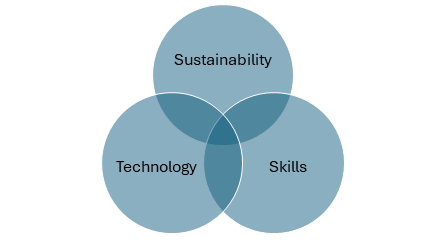The civil engineering industry has undergone significant advancements over time. From evolving design methodologies to a stronger focus on sustainability, the industry continues to adapt to modern demands. However, amid these changes, the fundamental principles of civil engineering remain steadfast.
Tenets of civil engineering
Despite rapid technological advancements, the core principles that guide civil engineering remain unchanged. The fundamental aspects of structural integrity, safety, and functionality have always been central to civil engineering. Collaboration remains a key component, ensuring that project teams – including engineers, designers, and construction professionals – work together to design and construct critical infrastructure.
While tools and methodologies continue to evolve, the principles of problem-solving and teamwork remain crucial for every engineer.
Addressing the skill shortage
One of the most pressing challenges in the Australian civil engineering industry today is the shortage of new recruits joining the profession. There is a significant gap in qualified professionals, which places pressure on project delivery and innovation.
Currently, skilled immigration helps to attract talent from around the world, strengthening and diversifying our existing workforce. In the coming years, greater efforts will be needed to encourage and support young Australians to pursue a career in civil engineering.
Industry-wide collaboration is necessary to address this challenge effectively by supporting high school students with clear career pathways.
Sustainability: The role of civil engineering
Sustainability is a major focus across all industries, and civil engineering plays a crucial role in achieving sustainable development goals. Several key practices can drive meaningful change:
- Embracing the circular economy: Increasing the use of recyclable materials in civil infrastructure and designing components for disassembly rather than single use.
- Leveraging digital twins: Creating digital models of infrastructure before and after construction to optimise designs and improve efficiency.
- Carbon neutrality efforts: Digitising civil infrastructure to better calculate embedded carbon and support carbon neutrality goals.
- Revolutionising water use: Reserving potable water for essential uses like drinking and showering while maximising stormwater reuse for industrial and agricultural applications.
- Designing for climate resilience: Developing infrastructure that can withstand extreme weather conditions and evolving environmental challenges.
Future trends in civil engineering
Sustainability will have the most significant impact on civil engineering in the coming years. The choices made today will shape the environmental legacy of future generations. Beyond sustainability, technological advancements, particularly in artificial intelligence (AI), will also transform industry practices.
AI will enhance collaboration among project teams, automate repetitive tasks, and improve design accuracy. However, it will not replace the fundamental principles of engineering or the necessity for human expertise. Instead, it will serve as a tool to improve efficiency within the industry.

The shift toward sustainability marks a major departure from past practices, making it imperative for civil engineers to lead the way in sustainable innovation. The actions taken now will define the industry’s impact in the years to come.
The civil engineering industry stands at a pivotal moment. While the principles of engineering remain constant, adaptation is necessary to meet modern challenges. Addressing skill shortages, integrating sustainable practices, and embracing technological advancements will ensure the industry continues to build a resilient and sustainable future.
Written by Glenn Barker, Civil Engineer & Director
